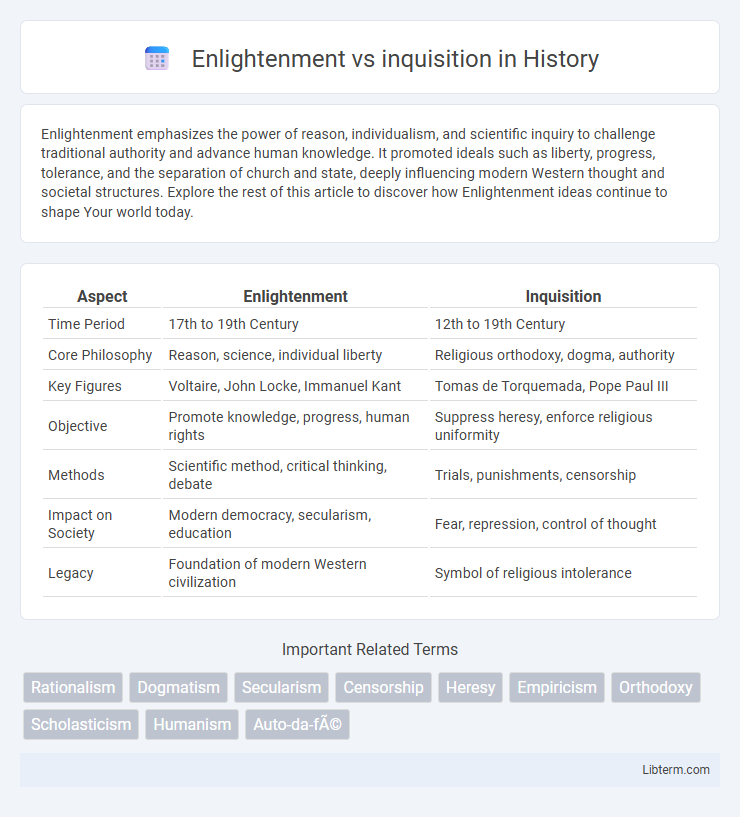Enlightenment emphasizes the power of reason, individualism, and scientific inquiry to challenge traditional authority and advance human knowledge. It promoted ideals such as liberty, progress, tolerance, and the separation of church and state, deeply influencing modern Western thought and societal structures. Explore the rest of this article to discover how Enlightenment ideas continue to shape Your world today.
Table of Comparison
| Aspect | Enlightenment | Inquisition |
|---|---|---|
| Time Period | 17th to 19th Century | 12th to 19th Century |
| Core Philosophy | Reason, science, individual liberty | Religious orthodoxy, dogma, authority |
| Key Figures | Voltaire, John Locke, Immanuel Kant | Tomas de Torquemada, Pope Paul III |
| Objective | Promote knowledge, progress, human rights | Suppress heresy, enforce religious uniformity |
| Methods | Scientific method, critical thinking, debate | Trials, punishments, censorship |
| Impact on Society | Modern democracy, secularism, education | Fear, repression, control of thought |
| Legacy | Foundation of modern Western civilization | Symbol of religious intolerance |
Introduction to Enlightenment and Inquisition
The Enlightenment was an intellectual movement in the 17th and 18th centuries emphasizing reason, individualism, and scientific inquiry as foundations for knowledge and societal progress. In contrast, the Inquisition, established by the Catholic Church, aimed to suppress heresy and maintain religious orthodoxy through rigorous investigations and trials. The Enlightenment challenged the authority of institutions like the Inquisition by advocating for freedom of thought and secular governance.
Historical Context: Europe Before and After
The Enlightenment emerged in 17th-18th century Europe as a profound intellectual movement emphasizing reason, individualism, and scientific inquiry, directly challenging the authoritarian control and dogmatic beliefs enforced by the Inquisition. Before the Enlightenment, the Inquisition, particularly active in Spain and Italy, suppressed heretical ideas to maintain Catholic orthodoxy, leading to widespread censorship, persecution, and fear. After the Enlightenment, Europe witnessed a gradual decline of the Inquisition's influence, increased secularism, and the rise of modern democratic principles rooted in human rights and freedom of thought.
Core Philosophies: Reason vs Dogma
The Enlightenment emphasized reason, empirical evidence, and individual autonomy as the foundations for knowledge and societal progress, challenging traditional authorities and promoting critical thinking. In contrast, the Inquisition enforced dogma through institutional power, prioritizing faith and religious orthodoxy over rational inquiry and suppressing dissenting ideas. This philosophical divide illustrates the clash between evolving humanism and rigid theological control during the early modern period.
Key Figures: Enlightenment Thinkers and Inquisitors
Enlightenment thinkers such as Voltaire, John Locke, and Immanuel Kant championed reason, individual rights, and scientific inquiry, significantly influencing modern democratic ideals and human rights. In contrast, inquisitors like Tomas de Torquemada enforced religious orthodoxy through the Spanish Inquisition, using fear and persecution to maintain Catholic dominance and suppress dissent. The stark contrast between these key figures highlights the ideological clash between progressive Enlightenment values and the authoritarian enforcement of religious dogma during this period.
Science and Knowledge: Progress or Persecution
The Enlightenment championed scientific inquiry and empirical evidence, fostering rapid advancements in fields like physics, astronomy, and medicine. In contrast, the Inquisition suppressed intellectual freedom, persecuting scholars whose findings challenged religious doctrine or traditional beliefs. This clash between progress and persecution shaped the trajectory of knowledge, highlighting the transformative power of open inquiry against the forces of censorship.
Religion’s Role: Tolerance versus Orthodoxy
The Enlightenment emphasized religious tolerance, advocating for freedom of belief and the separation of church and state to promote intellectual and social progress. In contrast, the Inquisition enforced strict religious orthodoxy, using persecution and censorship to maintain Catholic dogma and suppress dissent. This conflict highlights the historical tension between progressive religious pluralism and rigid theological control.
Social and Cultural Impact
The Enlightenment fostered critical thinking, individual rights, and scientific inquiry, dramatically transforming European societies by promoting secularism and challenging traditional authorities. In contrast, the Inquisition enforced religious orthodoxy through censorship and persecution, stifling intellectual freedom and cultural expression. This clash profoundly influenced the development of modern Western values, shaping contemporary attitudes towards knowledge, religion, and human rights.
Freedom of Thought and Expression
The Enlightenment championed freedom of thought and expression as fundamental human rights, promoting rational inquiry, individualism, and skepticism of traditional authority, which fueled advancements in science, politics, and philosophy. In stark contrast, the Inquisition enforced strict censorship and suppressed dissenting ideas through persecution, aiming to maintain religious orthodoxy and control over intellectual discourse. This clash between Enlightenment ideals and Inquisition practices highlights the historical tension between intellectual liberty and institutional repression.
Legacy: Influence on Modern Society
The Enlightenment championed reason, individual rights, and scientific inquiry, laying the foundation for modern democracy, human rights, and secular governance. The Inquisition, in contrast, symbolized religious dogmatism and suppression of dissent, highlighting the dangers of authoritarian control and intolerance. Together, their legacies underscore the ongoing struggle between freedom of thought and oppressive power structures in contemporary society.
Conclusion: Lessons from the Past
The Enlightenment's emphasis on reason, individual rights, and scientific inquiry starkly contrasts with the Inquisition's reliance on dogma and suppression of dissent. Historical analysis reveals that societies flourish when intellectual freedom and critical thinking are protected from authoritarian control. The enduring lesson underscores the necessity of safeguarding open discourse to promote progress and human dignity.
Enlightenment Infographic

 libterm.com
libterm.com